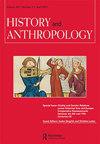摄取契约:莉迪亚·卡布雷拉,黄盲症,中国人的身体,和非裔华人宗教知识的产生
IF 0.4
2区 历史学
Q3 ANTHROPOLOGY
引用次数: 0
摘要
本文章由计算机程序翻译,如有差异,请以英文原文为准。
Ingesting indenture: Lydia Cabrera, yellow blindness, Chinese bodies, and the generation of Afro-Chinese religious knowledge
ABSTRACT This article explores the ways that Afro-Cuban religious texts called libretas and recorded oral divination narratives create entryways for Asian, especially Chinese, deities in the practice of Afro-Cuban religions, specifically the Yorùbá-derived orisha religion known as Lucumí. Lydia Cabrera, a self-taught ethnographer of Afro-Cuban religions, is a pivotal interlocutor in the generation of Afro-Chinese knowledge, having conducted fieldwork with practitioners of both African and Asian descent in Cuba whose ancestors were taken to Cuba as enslaved and unfree plantation labourers. Cabrera’s many published volumes, as well as her archive posthumously housed at the University of Miami, are important sources of information for both religious scholars and practitioners. By examining the exemplary divinatory narrative of the orisha Shangó travelling to China, as documented by Cabrera, we can better understand the processes of enmeshing, recording, and sharing of African and Asian knowledge and worldviews occurring in Afro-Atlantic religious practices.
求助全文
通过发布文献求助,成功后即可免费获取论文全文。
去求助
来源期刊

History and Anthropology
Multiple-
CiteScore
1.80
自引率
0.00%
发文量
41
期刊介绍:
History and Anthropology continues to address the intersection of history and social sciences, focusing on the interchange between anthropologically-informed history, historically-informed anthropology and the history of ethnographic and anthropological representation. It is now widely perceived that the formerly dominant ahistorical perspectives within anthropology severely restricted interpretation and analysis. Much recent work has therefore been concerned with social change and colonial history and the traditional problems such as symbolism, have been rethought in historical terms. History and Anthropology publishes articles which develop these concerns, and is particularly interested in linking new substantive analyses with critical perspectives on anthropological discourse.
 求助内容:
求助内容: 应助结果提醒方式:
应助结果提醒方式:


